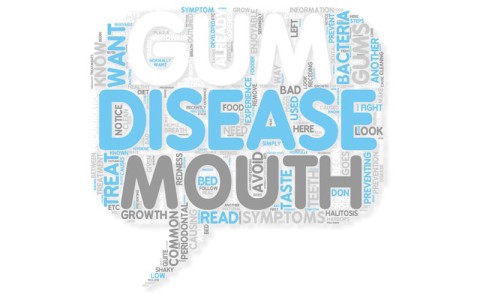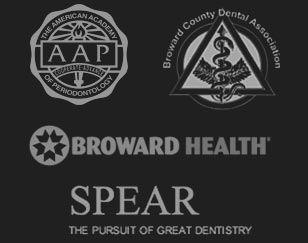
FALLACY: Tooth loss is a natural part of aging.
FACT: With good oral hygiene and regular professional care, your teeth are meant to last a lifetime. However, if left untreated, periodontal (gum) disease can lead to tooth loss. It is the primary cause of tooth loss in adults 35 and over.
FALLACY: People who have gum disease are “dirty” and don’t brush their teeth.
FACT: Research proves that up to 30% of the population may be genetically susceptible to gum disease. Despite aggressive oral care habits, these people may be six times more likely to develop periodontal disease. Identifying these people with a genetic test before they even show signs of the disease and getting them into early interventive treatment may help them keep their teeth for a lifetime.
FALLACY: Gum disease doesn’t affect overall health.
FACT: Emerging research links periodontal disease to other health problems including heart and respiratory diseases; preterm, low birthweight babies; stroke; osteoporosis; and diabetes.
FALLACY: Gum disease is a minor infection.
FACT: The mass of tissue in the oral cavity is equivalent to the skin on your arm that extends from the wrist to the elbow. If this area was red, swollen, and infected, you would visit the doctor. Gum disease is not a small infection. Its result, tooth loss, leads to a very different lifestyle—dentures. The changes in your appearance, breath, and ability to chew food are dramatic.
FALLACY: Bleeding gums are normal.
FACT: Bleeding gums are one of nine gum disease symptoms. Think of gum tissue as the skin on your hand. If your hands bled every time you washed them, you would know something is wrong. Other signs of gum disease include: red, swollen or tender gums; sores in your mouth; gums that have pulled away from the teeth; persistent bad breath; pus between the teeth and gums (leaving bad breath); loose or separating teeth; a change in the way the teeth fit together; and a change in the fit of partial dentures.
FALLACY: Gum disease affects all races and ethnicities equally.
FACT: While gum disease can affect anyone, certain populations are especially at risk. Research reported in the Journal of Periodontology has shown that Mexican Americans and African Americans are more likely to develop periodontitis than people of European descent. While the reason for this increased risk is not known, it may be due to the frequency of dental visits or different inflammatory responses in different ethnicities. Additionally, a study from the New York University College of Dentistry found that of all recent U.S. immigrants, those who come from Puerto Rican, Indian, or Haitian backgrounds were much more likely to have periodontitis than immigrants of other backgrounds, possibly due to variance in diet and susceptibility to the oral bacteria that causes gum disease.
FALLACY: Treatment for gum disease is painful.
FACT: New gum disease treatments including local anesthesia and over-the-counter medications, have made patients’ treatment experiences pleasant and comfortable. Many patients find they are back to normal routines on the same day or by the next day.
FALLACY: Gum disease is easy to identify, even in its early stages, so my dentist would tell me if I had it.
FACT: Millions of people don’t know they have this serious infection that can lead to tooth loss if not treated. You should always get involved in your dental care, so that problems are detected in the early stages. You should inform your dentist if any signs of gum disease are present; or if any changes in your overall health or medications occurred in between visits. Most importantly, you should ask your dentist about your periodontal health and what method was used to evaluate its condition. This level of participation enables you to work in a team approach with your dentist to identify subtle changes that may occur in the oral cavity.
FALLACY: Once teeth are lost, the only treatment options are crowns, bridges or dentures.
FACT: Dental implants are a permanent tooth-replacement option for teeth lost to trauma, injury or periodontal disease. Dental implants are so natural-looking, and feeling that many patients forget they ever lost a tooth.
FALLACY: Cavities are the number-one cause of tooth loss.
FACT: Periodontal disease is the number-one cause of tooth loss. According to the 1996 American Dental Association/Colgate survey, U.S. dentists say gum disease is a more pressing oral health concern than tooth decay by a 2-to-1 margin.
FALLACY: Because gum disease is a bacterial infection, antibiotics can be used to treat it.
FACT: Research demonstrates that antibiotics can be a helpful adjunct to treating periodontal disease. However, medical and dental communities are concerned about the overuse of these medications in treating infections because of the possibility of the development of antibiotic resistant strains of bacteria. This overuse would be detrimental to patients if they develop a life-threatening illness for which antibiotics would no longer be helpful.
FALLACY: Pregnant women should skip professional dental checkups.
FACT: Teeth and gums are affected during pregnancy like other tissues in the body. In order to decrease the risk of damaging the gums and tissues surrounding the teeth, pregnant women should schedule an appointment for a periodontal evaluation.
Information provided by: www.perio.org


